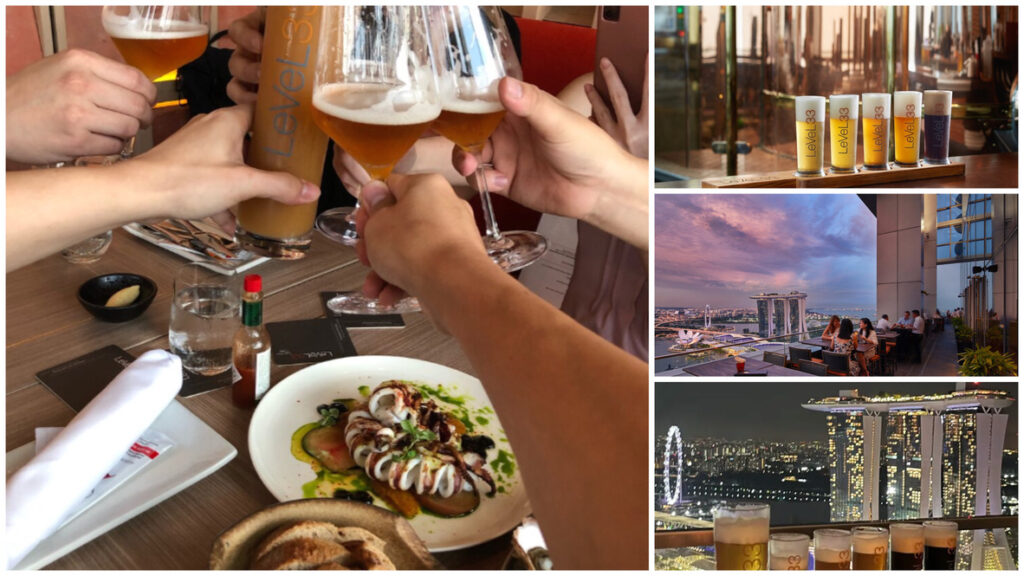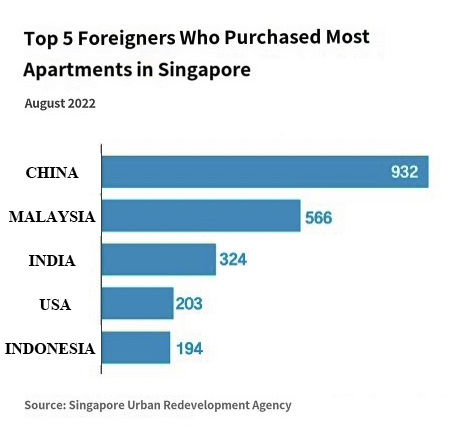
Where is the most popular wine bar among the rich in China these days. If you recall the courtyard of a Beijing luxury house, the highest floor of the Office Tower in central Shanghai, you are wrong. This wine bar is in Singapore, not mainland China. It is a wine bar named Circle 33 next to Scottsuro, a six-lane road in central Singapore. It is located in a bungalow with a wide garden decorated with antique Chinese antiques and sculptures such as Jinshihwangneung Byeongmayong, turtle and crane statues. It is a “hot place” that has emerged as the number of rich Chinese immigrants to Singapore has soared. “It’s a place where a rich man who first moved from China to Singapore should visit at least once like a rite of passage,” the media said.

“The members here discuss how to roll hundreds of millions of dollars until dawn, smoking high-end Cuban cigars and drinking Bordeaux wine.” Chinese rich people’s “China Exodus” is becoming steep. This is because he is tired of the zero-corona policy that has lasted for nearly three years, and the sluggish Chinese economy shows no signs of reviving. On top of that, the number of immigrants from abroad is increasing due to fears of unpredictable regulations by the Communist Party, which has proposed “joint wealth.” According to immigration consulting firm Henry & Partners, China was the country where HNWI with more than $1 million in financial assets was withdrawn the most last year. Last year, 10,800 HNWIs left and 13,500 millionaires are expected to leave this year. The main destination for Chinese millionaires leaving the mainland is Singapore. In April, the Financial Times (FT) reported that “Singapore is considered as a ship to weather the storm that will blow on them amid deepening economic and social problems in China.” The number of HNWIs who moved to Singapore last year was 2,900, up about 90% from 2019, with many Chinese. Andrew Amoris, a senior researcher at asset information firm New World Wells, predicted, “Up to 3,500 HNWIs will move to Singapore this year, most of which will be Chinese.” Money is flocking to Singapore due to “wealth immigration” from China. According to the Singapore Monetary Authority (MAS), the number of “family offices,” a family corporation that manages high-value assets, has increased 14 times in three years from 50 in 2018 to 700 in 2021. FT estimated that the number of family offices increased to about 1,500 last year, and said more than half of the increase was due to the wealthy in mainland China. Through the family office, rich Chinese people solve various financial problems such as investment and property transfer, and receive income tax cuts provided by the Singapore government. The minimum asset management of the family office reaches Singapore 20 million dollars (about 19.3 billion won), but it is popular. As a result, assets operating in Singapore increased from S$4.7 trillion in 2021 to S$5.4 trillion last year. “A billion won whiskey party overflows with Maotai in VIP clubs.” Visitors are looking at Audi’s concept car model at the Audi Exhibition Hall installed at the Art Science Museum in Singapore’s Marina Bay Sands Hotel in March. There is also a wind of change in the commercial district. Hundreds of Chinese applicants flock to local international schools, and high-end Chinese restaurants with Michelin star ratings are fully booked until several months later. The top-end Bentley and Rolls-Royce cars were also sold in Singapore last year, with 87 and 78 units, respectively, led by the wealthy in China. The price of foreign-only membership at Sentosa Golf Club in Singapore more than doubled from 2019 to S$880,000 as of last year. “Chinese customers have a party to offer Japanese Yamazaki 55-year-old whiskey worth $800,000 (about 1 billion won) a bottle,” said Pierce Cheng, CEO of Singapore’s investment immigration consulting firm AIMS. “We also bought $61,000 (market price) for them.”

Hong Kong’s South China Morning Post (SCMP) said, “There are many luxurious wine and cocktail bars in Singapore that have to pay high costs, and many VIP clubs and high-end restaurants for Chinese have recently been created.” “Last year’s Shanghai lockdown caused a surge to Singapore.” Obstacles are installed to prevent vehicles and people from coming and going in Shanghai, China, which was completely blocked in May last year due to the spread of COVID-19. Yonhap News Agency The Exodus of the rich in China was a turning point in April-May last year when Shanghai, the center of the Chinese economy, was completely blocked by the Zero Corona policy. At that time, Shanghai citizens suffered from a shortage of food and daily necessities with limited freedom of movement, and the richest people began to consider moving abroad, mainly in Singapore. Some analysts say that businessmen, who had been struggling with President Xi Jinping’s co-prosperity and stifling the company, began to escape in earnest to protect their assets when President Xi’s third consecutive term was confirmed in October last year. A case in point is Baofan, chairman of investment bank China Renaissance, who disappeared in February and was found to be under investigation by Chinese authorities. Before being investigated, Chairman Bao set up a family office in Singapore in December last year and tried to move some of his assets to Singapore, FT reported. The manufacturing purchasing managers’ index (PMI) stood at 48.8 last month, below 50 for two consecutive months, and the unemployment rate for young people aged 16 to 24 hit an all-time high of 20.8%, fueling the rich’s departure. Accordingly, there is a rumor among the wealthy in China that the amount needed for immigration to Singapore, which was believed to be possible with only 15 million yuan (about 2.4 million dollars) before the blockade of Shanghai, is now close to 100 million yuan (about 18 billion won). SCMP said, “The number of houses for sale in Shanghai surged from 100,000 in mid-March to 200,000 at the end of April, and housing prices fell by more than 10 percent.” “I like Singapore without Western sanctions,” there are many reasons why Chinese rich people prefer Singapore. First of all, there is a large Chinese population. About three-quarters of Singaporeans and permanent residents are Chinese. It is much higher than Malay (13.5%) and Indian (9%). Another great advantage is that Chinese is the official language. It has fewer regulations, such as lower income tax burden than China, and has a high-quality education system. A stable political environment is also attractive. The New York Times said, “Singapore, which restricts individual freedom by Western standards, may be dissatisfied, but for Chinese, it is enough not to arbitrarily change its policy based on the rule of law.”The international situation, including the war in Ukraine, also played a part. China’s wealthy were shocked by Western countries’ economic sanctions against Russia’s wealthy. Rupert Fujiwoff, chairman of Hurun Report, a market research firm that studies Chinese rich people, said, “Chinese rich people are concerned that their assets will not be safe in the United States, Europe, and Australia.” The Singaporean government is also worried about the Chinese real estate sweep.A luxury apartment located on Sentosa Island in Singapore in February. The rich in China buy a lot. For the Singaporean government, the migration of Chinese rich people is not pleasant. This is because they are reluctant to invest in financial products and others, which is not of great help to the Singapore economy. Bloomberg said, “Singapore hedge funds, banks, and private equity funds are worried that they cannot sign large contracts with the wealthy in China.” Instead, rich people in China are keen on investing in real estate. According to the Singapore Urban Redevelopment Administration, Chinese were the foreigners who bought the largest number of apartments (932 units) in Singapore until August last year. At the same time, 25% of 425 luxury houses were purchased in mainland China. As a result, Singapore housing prices rose 11.3% year-on-year in the first quarter. Housing rents also rose 28.2% in the fourth quarter of last year from a year ago, beating New York (18.6%) and London (17.8%). The Singapore government has imposed regulations on soaring housing prices. In April, the property tax rate paid by foreigners when purchasing a house was raised from 30% to 60% of the house price. In March, the minimum amount of investment needed for investment immigration was raised from $2.5 million to $10 million.
Nevertheless, it is expected that the Chinese will continue to travel to Singapore. “The Chinese rich, who have reduced the importance of freedom due to the Shanghai blockade, are trying to transfer assets, but the Chinese government is restricting overseas investment and controlling capital outflow,” he said. “The only option left is immigration, and Singapore, which is free from Western sanctions, is the best.”
JULIE KIM
US ASIA JOURNAL



